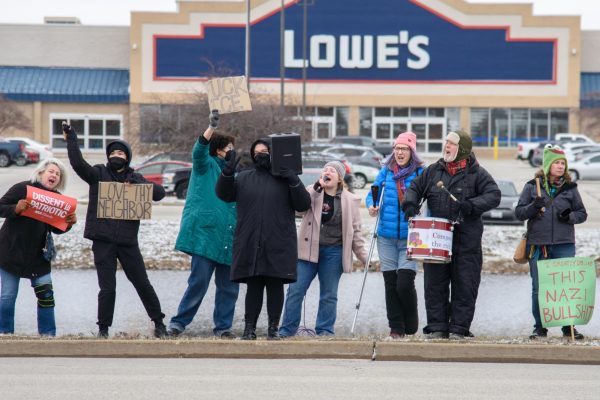Governor draws large crowd to death penalty film
Jan 31, 2005
Last updated on May 11, 2016 at 06:25 p.m.
A sold-out crowd of more than 200 showed up to see Deadline, a documentary that shows the process that led to former Illinois governor George Ryan commuting death sentences to life in prison for 167 Illinois prisoners, Sunday at Boardman’s Art Theatre in Champaign.
Ryan, along with the film’s co-director and anti-death penalty activist Kirsten Johnson, answered questions following the film. The event was held the day before the five-year anniversary of Ryan’s decision to place a moratorium on executions in Illinois.
The documentary was originally going to focus on influential legal decisions involving capital punishment, she said, but when Ryan put together a commission to study capital punishment in Illinois, the film’s producers decided to focus on Illinois’ problems with the death penalty.
Since Illinois reinstituted the death penalty in 1977, 12 people have been put to death and 13 people on death row have been found to be falsely convicted, Ryan said.
Get The Daily Illini in your inbox!
Ryan voted in favor of reinstating the death penalty in Illinois as a member of the Illinois general assembly in 1977, and he said he had supported the death penalty when he became governor.
However, after journalism students at Northwestern University gathered evidence that death row inmate Anthony Porter was innocent, Ryan said he began to rethink his support. He also said he was influenced by a 2002 series by the Chicago Tribune that detailed failings in the justice system including forced confessions, poor lawyers and testimony from prisoners in exchange for reduced sentences.
The film crew for the documentary did not have access to Ryan when they were shooting, but Johnson said the staff decided they should present the commission’s hearings and different viewpoints so the audience would get a sense of how Ryan came to the decision.
The film crew interviewed Ryan shortly after he announced the blanket commutation at a speech at Northwestern in January 2002; however, he had no input into the content of the film, Johnson said. Ryan appeared at the film’s premiere at the Sundance Film Festival in 2004 and has been helping with outreach activities since, she said.
Ryan said the death penalty has not been administered fairly and called it a “racist system.” He said he did not think it was possible to guarantee that an innocent person would not be killed.
“I say we shouldn’t have a system if it’s not going to be perfect – and it’s not a perfect system,” he said.
Ryan described his deliberation on whether to make the blanket commutation as an “emotional roller coaster.” He said that he went back and forth as he met with the families of victims and death row inmates. He said when he had to finally decide he thought a blanket clemency was the best way to address the issue.
Francis Boyle, a University law professor, announced after the film that he nominated Ryan for the 2005 Nobel Peace Prize and included a copy of Deadline with the nomination.
“Ryan has done more effective work against the death penalty than the entire abolitionist community in America put together,” Boyle said.
He said he had nominated Ryan the previous two years.
Members on the panel discussed their first-hand experience with the death penalty cases.
Bill Jenkins, an anti-death penalty activist whose 16-year old son, William, was killed in a robbery, said he convinced prosecutors not to seek the death penalty for the man who shot his son.
Jenkins, a member of the group Murder Victims’ Families for Human Rights, called the appeals process “incredibly abusive to victims’ families,” because they tend to drag on for several years. This also leads to families having to spend more time answering media questions, he said.
He also said that after the perpetrator is executed, it rarely makes anyone feel better.
“I don’t want someone else to die because my son was killed. I don’t need that type of quote justice,” he said.
Several audience members commended Ryan for his decision to question Illinois’ death penalty system.
“Ryan’s courage to think through the issues and understand the flaws in the system … and take the burden of an unpopular decision really impressed me,” said Urbana resident William Sullivan. He called the film “very powerful.”
Tony Jones, a former inmate who was assigned to work on death row in Menard Correctional Center in Menard, Ill., praised the governor for his decision during the question and answer session after the film.
“I know the smell of death. I used to work up there. I know how it feels to smell death,” he said.
Jones said that the death penalty does not prevent crime and echoed the concerns of others that those who are poor have the odds against them.
“I talked to so many people who I know in my heart were not guilty,” he said.
“This was something done for the sake of humanity … he made the right decision,” he said.
The film did not change the minds of some in the audience. Joe Garrett, a police officer in Rankin, Ill., said although he thought the film was well-made he still believes in the death penalty. He criticized the way Ryan handled the clemency proceedings.
“I believe they didn’t have enough time to truly evaluate each case,” he said.
Garrett said he thinks death penalty cases should require extra scrutiny.
Johnson said holding outreach events such as Sunday’s screening were an important part of the documentary.
“It made no sense for us to make this film and not have this kind of an outreach plan,” she said.
Gov. Rod Blagojevich, Ryan’s successor, has observed the moratorium; however, there are currently 10 people on death row in the state, according to the film’s Web site.





